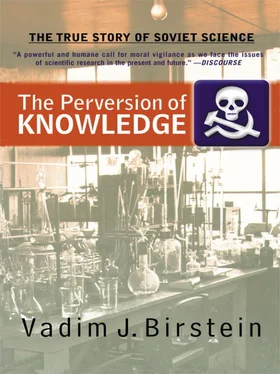At first, Bulgarian agents tried to touch him “accidentally” with a cream that would cause death from a “heart attack” within one to two days. It would be impossible to identify the poison. They then tried to poison Markov with a chemical dissolved in a drink (a method strongly reminiscent of Dr. Mairanovsky’s experiments). This attempt also appeared to be unsuccessful. Only the ricin succeeded. Before killing Markov, the Bulgarian Secret Service had successfully tried the method on a convict condemned to death: an umbrella fired a bullet perforated with small holes filled with ricin. 147In 1978, General Dimitar Stoyanov, Bulgarian interior minister, presented General Kalugin with an expensive Browning hunting rifle as a reward for KGB assistance in killing Markov. 148
The “umbrella murder” case has not been closed yet. In 1998, Bulgaria’s National Investigation Office was still trying to find Francesco Guillino (presumably Markov’s killer), to charge him with the murder. 149Guillino may have settled in Hungary or Romania.
The life of another Bulgarian defector, Vladimir Kostov, was saved because a similar pellet was removed from his back intact, before the ricin had time to escape from the steel bullet. This incident took place in the Paris metro. Seven years later, General Golubev supervised the drugging of a future KGB defector, Oleg Gordievsky, with drugs from Laboratory No. 12 in an attempt to get him to confess. 150It is known that sometimes dissidents in the Soviet Union were drugged in order to elicit confessions.
Another defector, who moved to the United States in 1992, is Dr. Kanatjan Alibekov, or Ken Alibek, as he is now known. Alibek, former deputy director of a Soviet biological warfare agency called Biopreparat, recently disclosed that the KGB had (and maybe the SVR and FSB still have) close contacts with the Ministry of Health’s institutes that specialized in the development of psychotropic and neurotropic biological agents. 151The network of medical institutions that investigated biological agents that could cause nonlethal and lethal organic and physiological changes useful for the KGB purposes had a name—the Flute Program. 152Basically, five research institutes in Moscow and the Moscow Region that belonged to the Third Main Directorate of the USSR Ministry of Health (Medstatistika; Institute of Applied Molecular Biology; Institute of Immunology; Scientific and Production Center of Medical Biotechnology; and Center of Toxicology and Hygienic Regulation of Biopreparations) were involved in the Flute Program. In 1989, Valerii Butuzov, who was both a KGB/SVR colonel and a pharmacologist, was put on the staff of Biopreparat formally as an engineer. 153His job was to provide the former KGB Laboratory No. 12, now TsNIIST, with the new developments at Biopreparat, especially within the Flute Program.
During the reorganizations of 1996–1997, Biopreparat and many former biological weapons facilities seem to have been moved under the Ministry of Economics. 154The state agency Biopreparat has been transformed into the Russian joint stock company, RAO Biopreparat, with a trading branch, AOOT-Biopreparat-Tsentr, and an international operation branch via a Geneva-based company, Pharmachemtec Limited. At present, the Russian military scientists who control RAO Biopreparat also control the Russian pharmaceutical industry.
The creation of Biopreparat was not possible without the energy and enthusiasm of Academician Yurii Ovchinnikov, who merged molecular genetics achievements at the Academy of Sciences with the interests of the Soviet Ministry of Defense. 155I have already mentioned Ovchinnikov in Chapter 1; he was the youngest academician and the youngest vice president of the academy. Ovchinnikov was a tall elegant man who easily found a mutual language with academicians and the highest Soviet bureaucrats. He also created a Party career and became a member of the Central Committee. It is interesting to note that his family was a victim of Stalin’s regime—his father was arrested and the family was exiled. 156Ovchinnikov’s autocratic and ruthless style of administration was widely known among Soviet biologists. 157
In 1972, Ovchinnikov asked the Ministry of Defense to support the development of new types of bacteriological and toxicological weapons using genetic engineering methods. 158This secret program, “The Enzyme,” was started under his supervision. Beginning in 1973, a group of research institutes was united under the name Biopreparat. Besides Ovchinnikov’s very large Institute of Bioorganic Chemistry, three more Academy of Science institutes in Moscow were involved in the Enzyme project: the Institute of Molecular Biology (Moscow, directed by Academician Andrei Mirzabekov), the Institute of Protein (Pushchino, Moscow Region; directed by Academician Aleksandr Spirin), and the Institute of Biochemistry and Physiology of Microorganisms (Pushchino, Moscow Region; directed by Academician Georgy Skryabin, and after his death, by Professor Aleksandr Boronin). A special commission, the Inter-Agency Scientific and Technical Council, coordinated the secret work of institutions involved in the development of new types of biological weapons: the Academy of Sciences, the Ministries of Health, Agriculture, Defense, and Chemical Industry, and the KGB. It consisted of members from the principal scientific organizations of the Soviet Union, and then Russia, including directors of the academy institutes mentioned above and the secretary academician of the Biochemistry, Biophysics and the Chemistry of Physiologically Active Substances Division (since 1994, Physical-Chemical Biology Division), Academician Aleksandr Baev. 159Although Academician Baev (1903–1995) spent seventeen years in Stalin’s worst labor camps and in exile, 160he was a devoted supporter of the Soviet regime. In the 1980s–early 1990s, the Inter-Agency Council was headed by a minister of medical industry. It met once every two or three months to discuss the current needs of biological weapon development.
According to Alibek, in 1990, during the peak of Gorbachev’s perestroika, the KGB/SVR colonel at Biopreparat, Butuzov, approached Alibek with a plan to assassinate Zviad Gamsakhurdia, the former Soviet political dissident and at the time the newly elected president of Georgia. 161The KGB authorities (the operation was under the personal control of the KGB chairman Vladimir Kryuchkov) planned to use an aerosol of Ebola virus concealed in an empty box of Marlboro cigarettes for the assassination. 162An alternative method of killing that Butuzov also considered was spraying the steering wheel of the victim’s car with a poisonous agent. 163It seems that the plan was turned down by the Soviet leaders.
In 1992, Gamsakhurdia was ousted from office, and the former Soviet foreign minister, Eduard Shevarnadze, became Georgian president. The next year, on December 31, 1993, Gamsakhurdia died in mysterious circumstances. Officially his death was announced as a suicide. However, there were rumors that he was killed by Moscow agents. 164The killing of Gamsakhurdia was the last known assassination plan of Mairanovsky and Muromtsev’s KGB successors.
The KGB generously provided their secret service colleagues in many Eastern European countries with Mairanovsky’s arsenal of chemicals. In his recently published memoirs, Markus Wolf, chief of the foreign intelligence service of the Ministry of State Security of the German Democratic Republic, recalled:
One KGB man was dispatched to buyers throughout the Eastern bloc bearing wares such as untraceable nerve toxins and skin contact poisons to smear on doorknobs. The only thing I ever accepted from him was a sachet of “truth drugs,” which he touted as “unbeatable” with the enthusiasm of a door-to-door salesman… One day, in a fit of curiosity, I asked our carefully vetted doctor to have them analyzed for me. He came back shaking his head in horror. “Use these without constant medical supervision and there is every chance that the fellow from whom you want the truth will be dead as a dodo in seconds,” he said. We never did use the “truth drugs.” 165
Читать дальше











